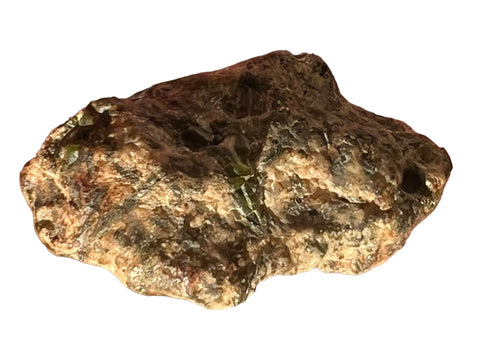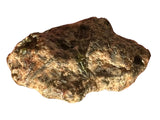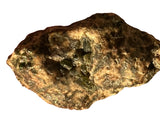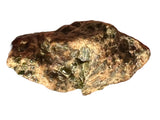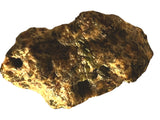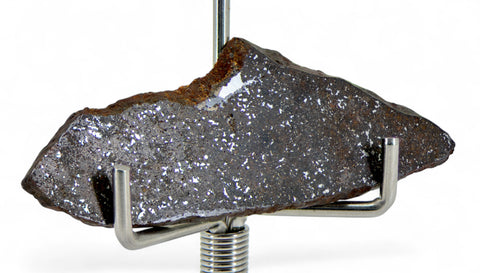3.44g Erg Chech 002 Ungrouped Achondrite Meteorite
On Offer: 3.44 gram complete individual of Erg Chech 002 achondrite-ung
Classification: Achondrite Ungrouped - this is an ungrouped achondrite from an unknown differentiated parent body.
Origin: Unkown
Description: A complete individual of an amazing ungrouped achondritic meteorite displaying large green diopside crystals. It was first analyzed and classified at the University of Washington, with the oxygen isotopic analysis having been done at a specialized lab at the University of New Mexico's Institute of Meteoritics. Later study has determined it to be among the oldest differentiated achondrites ever discovered. Its age challenges previously held ideas about the timing of the formation of various meteorite parent bodies during the earliest periods of the Solar System.
| Erg Chech 002 | |||||||||||||||||||||||||||||||||||||
|---|---|---|---|---|---|---|---|---|---|---|---|---|---|---|---|---|---|---|---|---|---|---|---|---|---|---|---|---|---|---|---|---|---|---|---|---|---|
| Basic information |
Name: Erg Chech 002 This is an OFFICIAL meteorite name. Abbreviation: EC 002 Observed fall: No Year found: 2020 Country: Algeria Mass:  31.78 kg 31.78 kg |
||||||||||||||||||||||||||||||||||||
| Classification history: |
This is 1 of 122 approved meteorites classified as Achondrite-ung. [show all] Search for other: Achondrites, Ungrouped achondrites |
||||||||||||||||||||||||||||||||||||
| Comments: | Approved 19 Jul 2020 Revised 9 Aug 2020: Updated information |
||||||||||||||||||||||||||||||||||||
Writeup |
Writeup from MB 109:
Erg Chech 002 (EC 002) 26.032°N, 1.611°W Adrar, Algeria Find: 2020 May Classification: Ungrouped achondrite History: Numerous stones containing distinctive large greenish crystals were found in May 2020 near Bir Ben Takoul, southern Algeria, within the Erg Chech sand sea. Three of these stones (weighing 1839, 467, and 207 g) were obtained by Rachid Chaoui, and two of them were subsequently purchased by Mark Lyon and one by Jason Utas. Additional stones (110, 178, 355, 360, 408, 480, 550, 587, 750, 805, 855, 1071, 1175, 1417, 1857, 2647, 3485, 3910, 4130, and 4140 g) were purchased in June and July 2020 from different Moroccan dealers by Ben Hoefnagels, Eric Twelker, Luc Labenne, Darryl Pitt, Vincent Jacques, Ziyao Wang, Marcin Cimała, Adam Aaronson, Michael Farmer and Aziz Habibi. Physical characteristics: The stones under classification (combined weight 31.783 kg) lack fusion crust, and have an overall relatively coarse grained, tan and beige appearance with sporadic larger green, yellow-green and less commonly yellow-brown crystals (up to 9 cm by 4 cm in some specimens). Some minor reddish-brown staining is evident in the groundmass regions. This classification is based on direct analysis of samples from the 1839 g stone augmented by examination of photographs and descriptions of other stones found with them. Petrography: (A. Irving, UWS and P. Carpenter, WUSL) Unbrecciated igneous texture. Sporadic pyroxene megacrysts (ranging in size from 1.7 to 11.5 mm in the studied thin section), exhibiting angular or ellipsoidal and embayed shapes, and comprising orthopyroxene (of varying composition), pigeonite and augite occur within a dominant, medium to relatively coarse grained groundmass. The cores of each of the analyzed megacrysts are fairly homogeneous in composition, but all are mantled by zones of different composition and distinct, fine grained rim overgrowths against the groundmass parallel to grain outlines (irrespective of geometry). Some low-Ca pyroxene cores contain thin lamellae and some larger inclusions (up to 300 µm) of Ti-poor chromite. The groundmass representing the major portion of the specimens (mean grainsize ~1.5 mm) is composed predominantly of exsolved pigeonite (commonly as radiating clusters of prismatic grains) and lath-like sodic plagioclase (zoned from irregular oligoclase cores to albitic rims with oriented dagger-like K-feldspar exsolution blades) together with accessory Ti-chromite, ilmenite (some as rims on chromite), troilite, silica polymorph (with a curved "fish-scale" fracture pattern suggestive of cristobalite), merrillite, and rare Ni-poor metal (in composite grain clusters with ilmenite, Ti-chromite and troilite). Secondary weathering products include minor goethite after primary troilite and metal, and sporadic very thin veinlets of calcite. Geochemistry: Orthopyroxene megacryst #1 (core Fs17.7Wo3.3; mantle Fs23.4-31.1Wo3.4-3.8; rim Fs37.6-42.5Wo2.9-3.3; FeO/MnO = 21-26, Cr2O3 = 0.3-0.5 wt.%; N = 6), orthopyroxene megacryst #2 (core Fs14.4±0.0Wo2.2-2.3; mantle Fs19.2-28.7Wo2.0-2.1; rim Fs33.1-36.8Wo2.8-3.5; FeO/MnO = 17-26; Cr2O3 = 0.3-1.0 wt.%; N = 7), orthopyroxene megacryst #3 (core Fs22.8Wo1.2; mantle Fs30.8Wo2.2; rim Fs43.5Wo2.5; FeO/MnO = 16-23; Cr2O3 = 0.2-0.4 wt.%; N = 3), pigeonite megacryst (core Fs21.3Wo7.0; mantle Fs23.4Wo11.8; rim Fs40.7Wo5.0; FeO/MnO = 17-20; Cr2O3 = 0.3-0.8 wt.%; N = 3), augite megacryst (core Fs14.7-19.4Wo38.5-30.2; rim Fs24.7Wo38.1; FeO/MnO = 15-18; Cr2O3 = 1.1 wt.%; N = 4), groundmass exsolved pigeonite (low-Ca pyroxene host Fs42.3-52.2Wo2.9-4.6, FeO/MnO = 21-23, N = 6; augite exsolution lamellae Fs18.1-25.9Wo40.8-38.1, FeO/MnO = 18-22, N = 5), groundmass plagioclase (oligoclase cores and intergrown with pyroxene megacrysts Ab68.8-79.0An26.7-17.9Or4.4-2.6, N = 6; albitic rims on laths Ab84.4-86.7An11.4-7.1Or4.2-7.0, N = 5), K-feldspar exsolution blade in albite (Or84.1Ab11.3An4.6), Fe metal (Ni = 0.13-0.18 wt.%, N = 2). Oxygen isotopes (K. Ziegler, UNM): analyses of acid-washed subsamples of groundmass and an orthopyroxene megacryst by laser fluorination gave, respectively: groundmass δ17O 1.548, 1.788, 1.831, 1.773; δ18O 3.201, 3.657, 3.728, 3.593; Δ17O -0.142, -0.143, -0.137, -0.123 (linearized, all per mil, TFL slope = 0.528); megacryst δ17O 1.780, 1.639, 1.682; δ18O 3.594, 3.329, 3.379; Δ17O -0.117, -0.119, -0.103 (linearized, all per mil, TFL slope = 0.528). Magnetic susceptibility log χ (× 10-9 m3/kg) = 3.06. Classification: Achondrite (ungrouped, gabbroic with pyroxene megacrysts, sodic). Although the exsolved pigeonite in this meteorite is reminiscent of pyroxene in typical eucrites (with the notable exception of systematically much lower FeO/MnO ratios), the highly sodic and mildly potassic plagioclase is very different from the much more calcic plagioclase in eucrites (typically bytownite to anorthite, and only rarely as sodic as calcic labradorite Ab33An67). The cores of orthopyroxene megacrysts differ from typical diogenitic orthopyroxene in usually being more magnesian, more Cr-rich and having lower FeO/MnO ratios. Oxygen isotopes (Δ17O values) plot between the field for the majority of eucrites and the trend for angrites, in the vicinity of values for anomalous eucrites Bunburra Rockhole, Emmaville, Asuka 881394 and EET 92023. However, Erg Chech 002 is mineralogically quite different from those four meteorites in many respects, most notably the prevalence of highly sodic plagioclase and lower FeO/MnO ratios in pyroxenes. Specimens: 50.1 g including one polished thin section and one polished mount at UWB; main mass of the 1839 g stone and the 207 g stone with Mr. M. Lyon; 467 g stone with Mr. J. Utas; 110 g stone with Mr. E. Twelker; 4140 g stone, 355 g stone and main mass of 408 g stone with Mr. B. Hoefnagels; 480 g stone with Mr. L. Labenne; 587 g, 855 g, 1071 g and 1417 g stones with DPitt; 550 g stone with Mr. M. Cimała; 4130 g stone with Mr. V. Jacques; 805 g stone with Mr. Ziyao Wang; 1857 g stone with Mr. S. Jurvetson; 2647 g stone with Mr. T. Boudreaux; 1175 g and 3485 g stones with Farmer; 178 g and 360 g stones with Aaronson; 3910 g stone at MMGM; 750 g with Mr. A. Habibi; 892 g with Matthew Stream. |
||||||||||||||||||||||||||||||||||||
| Data from: MB109 Table 0 Line 0: |
|
||||||||||||||||||||||||||||||||||||
| Plots: | O isotopes: |
||||||||||||||||||||||||||||||||||||
| Institutions and collections |
UNM: Institute of Meteoritics MSC03 2050 University of New Mexico Albuquerque NM 87131-1126 USA, United States; Website (institutional address; updated 12 Feb 2015) UWS: University of Washington, Department of Earth and Space Sciences, 70 Johnson Hall, Seattle, WA 98195, United States (institutional address; updated 15 Jan 2012) WUSL: Washington Univ., One Brookings Drive, St. Louis, MO 63130, United States (institutional address; updated 17 Oct 2011) UWB: University of Washington, Box 353010 Seattle, WA 98195, United States (institutional address; updated 27 Jul 2012) Aaronson: Sahara Overland Ltd., Harhora, Temara, 12000, Morocco (private address; updated 3 Jan 2010) Boudreaux: Terry Boudreaux, Illinois, United States (private address) DPitt: Darryl Pitt, 225 West 83rd Street, New York, NY 10024, United States; Website (private address) Labenne: 23, rue de Esperance, 75013 Paris, France; Website (private address; updated 29 Aug 2012) Twelker: Eric Twelker, P.O. Box 844, Port Townsend, WA 98368, United States; Website (private address; updated 1 Dec 2014) MMGM: Maine Mineral and Gem Museum, PO Box 500, 99 Main St., Bethel, ME 04217, United States; Website (institutional address; updated 9 Jan 2020) |
||||||||||||||||||||||||||||||||||||
We Also Recommend

